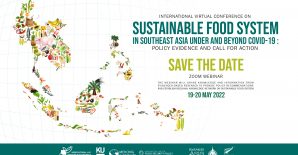The policy measures taken by the Government of Myanmar to contain the transmission of COVID-19 were necessary and appropriate responses to the pandemic. Unfortunately, policy measures of this magnitude will inevitably have economic costs for firms, households, government, and the overall economy. An in-depth analysis of these impacts is key to the design of policy interventions that can mitigate economic loss and support a sustained and robust recovery. In their research, Xinshen Diao, Nilar Aung, Wuit Yi Lwin, Phoo Pye Zone, Khin Maung Nyunt, and James Thurlow used a social accounting matrix multiplier model to assess the effects of the COVID-19 pandemic on Myanmar’s economy. You can read the full working paper in English here. The policy note is also available in English here and in Burmese here.
Myanmar’s policy responses to COVID-19
COVID‑19 and the mitigation policies imposed to control the spread of the disease have resulted in unexpected shocks to Myanmar’s economy. When industries and businesses must suspend operations, such policies have the potential to create catastrophic direct impacts on economic sectors.
Myanmar’s economy is deeply integrated into complex supply networks domestically and internationally, and policies affecting an industry can have major indirect impacts on other economic sectors through supply and demand linkages. For the agriculture, industry, and service sectors, these policies are expected to have an impact through several different pathways:
- Restrictions on residents’ movement and transportation could affect production, processing, and supply chain activities in all economic sectors.
- Closure of non-essential businesses including most manufacturing factories, construction sites, hotels, and restaurants could largely impact employment and the overall economy.
- Restrictions on banking hours and suspensions on microfinance institution operations could slow normal financial functions such as payments, fund withdrawals and transfers, and loans, which businesses need to maintain their cash flow.
Although Myanmar eased the lockdown in late April, restrictive policies were maintained and new ones were imposed post-lockdown. Experiences from previous natural disaster shocks in Myanmar and the COVID-19 recovery in China, which started in late February and early March, indicate that most countries around the world, including Myanmar, are unlikely to return to a normal situation soon. Thus, it is necessary to assess the broad economic impacts of COVID-19 not only for the lockdown period but also for all of 2020.
Measuring the costs
In their assessment, the research team applied a social accounting matrix (SAM) multiplier model to evaluate the direct and indirect effects of the COVID-19 pandemic on Myanmar’s economy. Ideally suited to measuring short-term direct and indirect economy-wide impacts of unanticipated, rapid-onset economic shocks such as COVID‑19, the SAM multiplier model is a simulation tool that describes the economic connections between actors within the national economy and provides a highly disaggregated picture of the economy. The Myanmar SAM multiplier model captures 63 distinct activities and sectors to characterize Myanmar’s economy in 2019. The research team evaluated the effects of COVID‑19 resulting from external shocks to Myanmar’s economy that affect exports and tourism, interrupt export-oriented manufacturing supply chains, and lower international remittance incomes and policy-induced shocks resulting from the necessary response of the Government of Myanmar to the pandemic.
Main findings
Using the Myanmar SAM multiplier model, the research team considered different recovery scenarios throughout 2020. The found that:
- National GDP is predicted to decline by 41 percent during the two-week lockdown period compared with a normal situation without COVID-19 during the same period. The COVID‑19 pandemic will likely push Myanmar’s economy into a recession or lead to stagnant growth in 2020.
- The agri-food system (AFS) is adversely affected by falling consumer and export demand. Although the lockdown policies provide exemptions for most agricultural activities, linkages to other sectors indirectly affect the AFS sector significantly. Economic recovery in the AFS sector will be slow. In the case of a slow recovery for the overall economy, the annual growth rate in the sector for 2020 will be negative. With a faster recovery, stagnant growth is the best that can be expected.
- Closure of manufacturing factories will have a large negative impact on both the AFS and the overall economy due to the strong linkage effects between manufacturing, upstream primary agriculture, and downstream marketing services.
- Non-farm employment is predicted to decline by more than five million jobs during the lockdown period. Compared to a slow economic recovery, a fast recovery would allow 1.1 million more people to return to their jobs or businesses by the end of FY 2020. However, even with fast recovery, there will be 500,000 non-farm jobs lost in 2020.
- Household income is predicted to fall across all household groups, falling most among rural non-farm households and urban households. Fast recovery can reduce the loss in household income, particularly for rural non-farm households. However, even with fast recovery, rural farm and non-farm households’ annual income will be 4.5 percent and 5.6 percent lower, respectively, than under a normal situation.
Policy recommendations
The economic costs of the COVID-19 pandemic for Myanmar’s economy should be interpreted as plausible predictions based on available information. In practice, the negative economic impacts of the current crisis could be greater than the findings from the SAM multiplier model. At the same time, government responses such as immediate protection of business and household income and longer-term economic stimulus packages could reduce the impact.
Results from the analysis suggest that the following actions are crucial for Myanmar’s economic recovery:
- Reopening the manufacturing sector for both Myanmar’s broad economy and agri-food system recovery
- Continued policy support to the agri-food system
- Expanding the coverage of social protection programs
- Considerations to increase the size of the national stimulus package
This post was cross-posted from the IFPRI Myanmar Strategy Support Program webpage. You can read the full working paper by the research team in English here. The policy note is also available in English here and in Burmese here.



